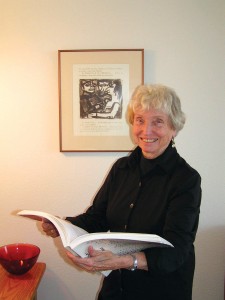Elizabeth R. Jackson, scholar and translator of French literature, is a Professor Emerita of San Diego State University. She has published extensively on French poetry and the French modern novel, including a translation of works by the Surrealist poet Benjamin Péret, A Marvelous World (LSU Press, 1985) and Meidosems by Henri Michaux (Moving Parts Press, 1993).
 COSMOGONIE INTIME
COSMOGONIE INTIME
An Intimate Cosmogony
Translation
Born of an impulse, this book represents an amalgam of like minds. Within seconds, one day’s encounter with Felicia, myself and Yves in Paris in 1995 set the stage for combining our voices—to be visibly encapsulated in book form: a model for twenty-first century cultural entente.
I am personally gratified to have clambered aboard as part of the book crew which was also a boat crew. The very first poem in the series starts as a sailing adventure. Yves, I believe, had this all in mind when he launched his very serious metaphysical trip, through time and space, exploring our world—our common cosmos.
My own lifetime trip started in Oregon. My father’s family were pioneers who crossed the plains westward in 1852. I grew up in Portland, went to Reed College for my B.A. and then set off east for a year in New York, followed by a year in Vermont. Soon after I married. My husband Gabriel Jackson and I went to France. There I radically switched interests and jobs—from Economics to French Literature, including a new world vista. This happened the year I studied Philosophy at the University of Toulouse. Later, with two babies in the family, I took courses for an M.A. in French Literature at Wellesley College and then went to Paris for my Doctorate at the Sorbonne. In the course of several more moves, I lived with my family in the U.S. on the East Coast and the Midwest, finally to settle in California as Professor of French Language & Literature at San Diego State University. Altogether I lived in France, in different places and at different times, for roughly seven years. I was absorbed in studying, research projects and generally immersed in France’s addictive provincial life style as well as in the Parisian milieu of art and literature, combined of course with everyday encounters, good food, good wine and good friends.
Altogether, my job of teaching in the U.S. included expected forays in writing and research and professional networking. My teaching and publications concerned French twentieth-century novelists—mainly Proust and Gide—and a composite group of French poets—André Chénier, Paul Valéry, Saint-John Perse, Benjamin Péret and René Char. Mainly my articles and books were works of literary criticism. Eventually, however, I branched into some particularly re-warding translation projects.
After retiring from San Diego State University, I found myself absorbed by the poetic narratives and the art of Henri Michaux. At that time I was living in Mendocino, California close to my artist friends Miriam and Ray Rice (whom I had first known in 1949 at the Putney School in Vermont). I launched again on an unexpected project, working with their daughter, Felicia Rice, well known already for her collector’s edition prize-winning books.
Our project was a book with my essay, notes and English translation of Michaux’s imaginary travel narrative about the Meidosem—creatures of his own invention—volatile, frag-ile yet tenacious. This book, published in 1948, included Michaux’s own lithographs which portray his elusive creatures and enliven their adventures. Felicia and I set our goal to replicate closely that original volume. So she designed our book as a livre d’artiste in trade edition. We wanted to share Michaux’s whimsical genius with many new readers.
The Michaux research led me on an unexpected course, meeting with people in France involved with various pro-ductive trends in late twentieth-century French thought, art and literature. Particularly important were my work and special friendship with Yves Peyré and his family. All this lead to that propitious meeting at the Bibliothèque Doucet in Paris where Cosmogonie intime was conceived.
This set of poems in French, linked progressively, needed special attention in order to construct a true, balanced and focused English version. My first task was always to design a framework for each stanza. For that, I would always respect the length of the lines and the stanza, the semantic and grammatical emphasis, the reflective sonority and original rhythms of Yves’s text in French. Also, the English poem needed to be phrased in naturally idiomatic form and as an equally refined linguistic equivalent. The poems thus “sound” different in English. They are different—but will, I hope, faithfully project the sense and effect of Yves’s verse in French.
Elizabeth R. Jackson
Medford, Oregon
Return to COSMOGONIE INTIME An Intimate Cosmogony